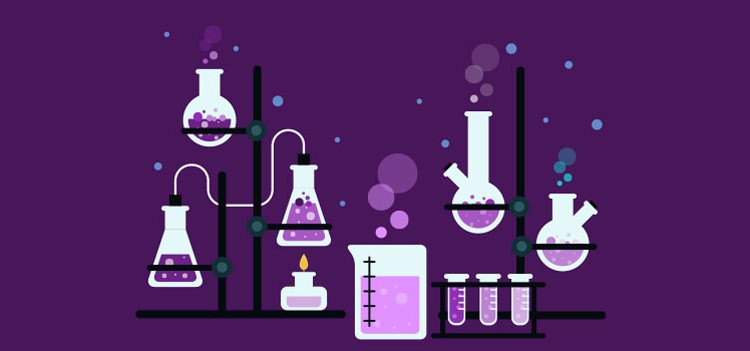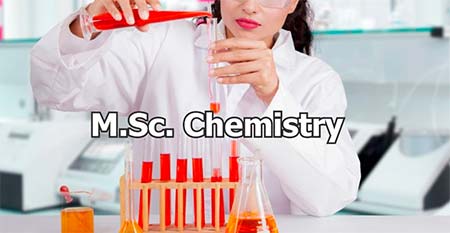Few lines about Chemistry
Chemistry is a branch of science that deals with the study of chemical reactions and their properties of different substances. Chemistry also deals with the study of matter and its properties, how and why the substances combine or separate to form other substances and how they interact with energy. Chemistry is a scientific discipline that involves elements and compounds composed of atoms, molecules and ions. It’s a study of composition, structure, properties, behaviour and the changes they undergo during reactions with other substances.
Introduction to M.Sc Chemistry
M.Sc Chemistry is a 2-year career oriented post-graduate course which deals with the study of a broad variety of modules in chemistry. The field of chemistry is basically divided into three types such as general, analytical and organic chemistry. The students can specialise in their desired branch of the chemistry. The M.Sc Chemistry students are trained in-depth about various techniques involved in chemical reactions that occur in the substances. The M.Sc Chemistry degree gives a solid base for higher degree programmes like M.Phil or PhD.
Branches of Chemistry
There are three important branches of chemistry they are General Chemistry, Analytical Chemistry and Organic Chemistry:
General Chemistry
General chemistry deals with the study of fundamental concepts, theories and laws of chemistry. It also deals with study of structure, properties and methods of obtaining the chemical elements and major chemical compounds using sophisticated instruments. The field of general chemistry also touches upon major applications of chemistry in industry and agriculture.
Analytical Chemistry
Analytical chemistry is the science of obtaining, processing and communicating information about the composition and structure of matter. In simple words, it is a science of determining what matter is and how much of it exists in nature. The analytical chemistry mainly deals with the study of instrumentations and techniques used to find out the quantity and quality of chemical substance.
Organic Chemistry
Organic Chemistry is the study of structure, properties, composition, reactions and preparation of carbon containing compounds, that typically includes hydrocarbons and other elements like hydrogen, nitrogen and oxygen. This branch of chemistry was only limited to living organisms in olden days, but now it has broadened its spectrum to include different man made substances like plastics, pharmaceuticals, petrochemicals, food, explosives, paints, cosmetics, biochemicals etc.
Eligibility for M.Sc Chemistry
- Students who have studied science in their PUC or 10+2 with 50% aggregate marks
- The students who have studied chemistry as one of the core subjects in their degree and should have scored 60% aggregate in all the subjects from recognised universities.
Admission Procedure
The admission to M.Sc Chemistry is done by two modes. The first one is merit based admission and second one is direct admission under management quota.
Merit Admission Process
There are some institutes that conduct entrance exams for M.Sc Chemistry Admission. The main reason for entrance exams is to select the serious and right candidates from the flock of non-serious ones. Students who are interested in merit seats can apply to institution-based entrance exams for admissions. The qualified students are shortlisted for merit seats. The merit seats have reasonable fee structure.
Direct Admissions under Management Quota
The students also have the option to get direct admissions under management quota. The main advantage in the direct admission process is that students can choose their desired colleges for their courses and pre-book them before starting of the academic year. Another plus point in direct admissions is that students will get confirmed admissions without even attending for any entrance exams (if any) that are conducted by educational institutions. Students interested in direct admissions can contact the educational experts at education guidance centres and get their admissions done instantly without undergoing any complex procedures.
Course Curriculum
The standard course curriculum that M.Sc Chemistry students will be studying are as follows:
- Inorganic Chains, Rings and Clusters
- Stereochemistry and Reaction Mechanisms
- Group Theory and Quantum Chemistry
- Analytical Chemistry
- Inorganic Semi micro Chemistry
- Physical Chemistry
- Synthetic Strategies and Pericyclic reactions
- Thermodynamics and Equilibria
- Spectroscopic Methods in Chemistry
- Solid State Chemistry and Materials Science
- Bioinorganic and Organometallic Chemistry
- Coordination Chemistry
- Bioorganic, Heterocyclic and Photochemistry
- Electrochemistry and Kinetics
- Spectroscopic Identification of Molecules
- Industrial Catalysts
- Green Chemistry
- Polymer Science
- Surface Science and Coating Technology
- Bioanalytical Chemistry
- Medicinal Chemistry
- Nan-Chemistry and Technology
Scope for M.Sc Chemistry
The field of chemistry is most preferred by many science graduates after engineering. The field of chemistry offers ample job opportunities across different areas. Chemistry is the integral part of life and everything on this earth is based on chemistry. Chemistry forms the basic components of both living and nonliving things around us. So, the chemistry professionals are preferred everywhere.
They can qualify UGC-NET exams to become professors and join in colleges and universities. They can choose to join doctorate programmes like M.Phil and PhD and take up research in the field of chemistry. They can join as research scientists in research labs and organisations. They can join as chemists in various pharmaceutical companies. They can join fertilizer producing companies and work in the research and development department. Hence, there is an enormous demand for M.Sc Chemistry students in the job markets.
Job positions available after M.Sc Chemistry
The M.Sc Chemistry students are basically hired in different job positions by different organisations. The students with good performance records are usually hired in top positions and are offered competitive salary packages
Important job roles are:
- Chemist
- Pharmacy Assistant
- Clinical research Associate
- Lab Assistant
- Toxicologist
- Technical Writer
- Chemical Engineer
- Pharmacologist
- Clinical Scientist
- Scientific Laboratory Technician
Top Recruiters for M.Sc Chemistry students
There are many organisations that hire M.Sc Chemistry students, they are:
- Rashi Chemicals
- BASF
- Tata Chemicals
- Shell Chemicals
- LG Polymers
- Mitsubishi Chemicals
- Reliance Industries
- Lupin Chemicals
- Aurobindo Pharma
- Glaxo-Smith
- Amway
- Loreal
- Hindustan Polymers
- Nerolac paints
- Asian Paints
- Nippon Paints
- Coromandel Chemicals
- PraxAir
- Bayer Chemicals
- Pidilite Industries
- India Glycol
Final Words
Hiring trends have changed over a period of time, today the hiring is not limited to one specific field but it has widened its scope across different sectors of the economy. The hiring managers are looking for the students with degrees in fundamental sciences. Chemistry comes under basic sciences and students with M.Sc Chemistry are most preferred individuals in recent years. There are ample job opportunities for these students as they are required in all sectors of the economy. The students who are interested in chemical reactions and properties can choose to join M.Sc Chemistry course and pursue their careers in the field of chemistry.





